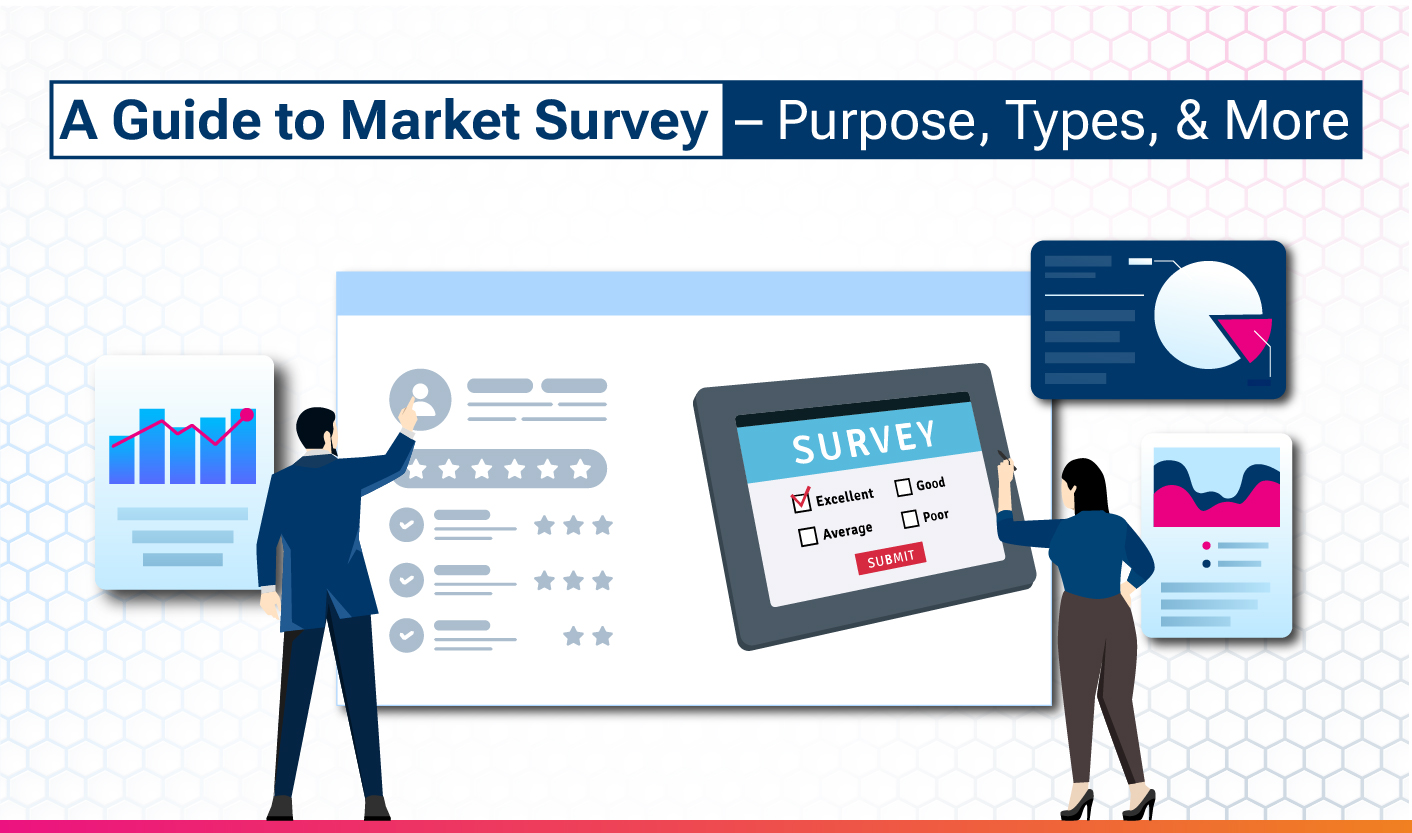Blogs
Services
A Guide to Market Survey – Purpose, Types, and More
Aug. 22, 2025

Making business decisions based on guesswork can be risky in today’s world. One wrong decision can lead to loss of money and reputation.
Therefore, no matter if you are planning to launch a new product, refine your existing services, or stay ahead of competitors, understanding your market is critical.
This is exactly where you will need a market survey.
It is a research tool that is designed to give you a clear picture of what customer prefers, what is trending in the market, and what the potential challenges are.
As a business, giving your customers what they are actually looking for can bring you both profit and reputation.
However, most often, businesses feel confused between the different Market Survey Types. They keep on wondering which one they should opt for their business?
In this blog, we will explore everything you need to know about market research surveys, types, benefits, and practical tips to conduct them effectively in your business.
What is a Market Survey?
To put it simply, a market survey is a systematic process of gathering, analyzing, and interpreting information.
This is done for a specific target market, its consumers, competitors, and overall industry trends.
By using different market research survey types, businesses can understand customer needs, evaluate demand for products or services, and identify potential opportunities or challenges.
Purpose of Market Survey
The benefits of market surveys go beyond just gathering information.
- Understand customer needs and preferences: Businesses identifies what their buyers truly want.
- Measure market demand: Businesses can determine the size and potential of the target market.
- Analyze competition: It helps businesses assess competitors’ strengths, weaknesses, and strategies.
- Identify market opportunities: It enables you to spot gaps or emerging trends for new products/services.
- Evaluate brand perception: Businesses can understand how customers view the company or product.
- Reduce business risks: It helps businesses base their decisions on data rather than assumptions.
- Support strategic planning: It helps guide product design, pricing, distribution, and promotion.
- Forecast sales potential: Businesses can estimate future performance before launch or expansion.
Market Survey Types
There are different market research survey types that businesses can use.
1. Online Surveys
Pros
Cost-effective and fast to distribute
Can reach a large audience regardless of geography.
Reduces human errors as collection and analysis is done digitally.
Cons
Lower response rates.
May exclude people with limited internet access.
2. Telephone Surveys
These are the surveys conducted over a phone call. These are done by trained interviewers, and are ideal for businesses looking to collect in-depth opinions, validate online data, or reach older demographics.
Pros
More personal than online surveys; interviewers can clarify questions instantly.
The response rates are higher compared to email or online forms.
Cons
Time-consuming and relatively expensive.
Limited to shorter surveys since long calls may lead to respondent fatigue.
3. Face-to-Face Interviews
These are direct interviews conducted in person, either structured or semi-structured. These surveys are ideal for businesses looking for product demonstrations, exploring complex topics, or conducting high-value B2B research.
Pros
Build strong rapport with respondents, ensuring accurate and detailed responses.
Non-verbal cues (body language, expressions) provide additional insights.
Cons
Logistically challenging and expensive to organize.
Limited reach, as interviews must be done in specific locations.
4. Focus Groups
These are the focus group discussions conducted among a small group of selected participants to gather qualitative insights. This is ideal for businesses looking to test advertising campaigns, new product features, or branding concepts.
Pros
Provides rich, detailed feedback about customer attitudes and perceptions.
Group dynamics often reveal opinions or ideas that wouldn’t surface in one-on-one settings.
Cons
Risk of dominant participants influencing others.
Costly and time-intensive to organize and analyze.
5. Mail Surveys
These are physical questionnaires sent to respondents via post, with recipients filling them out and mailing them back. These are ideal for research in rural areas or among audiences who prefer tangible communication.
Pros
It can reach audiences who are not digitally active.
Suitable for targeting specific geographies.
Cons
Slow response time and low return rate.
Requires manual data entry unless automated scanning tools are used.
How to Conduct a Market Survey?
To make informed business decisions, it is crucial to conducting market surveys correctly.
Define Your Objectives
Be clear with your outcomes.
Clearly define what you want to learn from the market surveys, like customer preferences, pricing expectations, brand awareness, or more.
Select Your Target Audience
Identify who you want to target. It can be a specific group of people relevant to your business. You can decide based on your existing users or a niche demographic.
Choose the Survey Method
It is vital to decide the right market survey type between online surveys, phone calls, in-person interviews, or focus group discussions. The decision often depends on your budget and target audience.
Design the Questionnaire
Ensure to keep your survey questions short, clear, and unbiased for quick and more responses.
Collect Responses
Ensure to collect enough data to make the results statistically reliable. To collect responses in larger quantities, businesses can use digital tools, survey agencies, or direct outreach.
Analyze the Data
Look for patterns, key insights, and actionable recommendations during data analzis.
Take Action Based on Insights
Improve your offering or adjust your strategies with the collected data.
Conclusion
To grow your business, conducting a well-planned market survey is not just about asking questions, it is about gathering customer needs, market trends, and many other key insights to make smarter business decisions.
Eventually, it can help you reduce risks, uncover opportunities, and align your strategies with real customer needs.
Moreover, by choosing the right market survey type and acting on the findings, you create a competitive edge that drives long-term growth.
As a business, giving your customers what they are actually looking for can bring you both profit and reputation.
